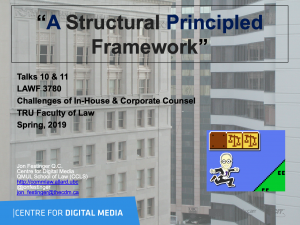Most Recent Posts
Do in-house counsel have enough information to prevent Corporate Scandal?
Whenever a significant corporate scandal occurs, an early question posed by most everyone is: Where were the lawyers? This question rests on the not unreasonable tenet that lawyers, who after all swear an oath to uphold the rule of law, can, should and must prevent corporate scandals from happening. Moreover, the truth is that in-house counsel often seem particularly well-positioned to prevent unethical corporate behaviour.
That well positioned counsel can prevent wrongdoing is unfortunately only part of the story. For one thing corporate scandals are not the norm. Instead, they often are both symptom and outcome of deeper organizational problems and toxic corporate cultures.
Even if a lawyer is both conscientious and proactively diligent, problems will persist. Why? Because of what the lawyer doesn’t – or more specifically what the lawyer was not told. A lawyer is only as good as what their client tells them. The telling question is what has the lawyer been told This is where the real problem lies both literally and figuratively. Even a lawyer who intends to become a “watchdog” and act as the ethical enforcer, what are the odds that lawyer will actually be given enough information to intervene meaningfully in a growing corporate scandal?
The challenge then is bridging the information gap between counsel and corporation. This is easier said than done however. Attempting to address corporate failure by imposing additional “reporting-up” duties onto lawyers may be misguided, for it fails to adequately address the responsibility of the primary decision makers in a corporation, mainly senior officers and directors.
Accordingly, we perhaps ought to focus attention on the responsibilities of key decision-makers to be transparent with their in-house counsel. One way this could be achieved is by requiring directors and officers to have in-house counsel present for major decision-making. In theory, such a duty to inform would ensure that lawyers can do their jobs correctly and corporations are more legally compliant. No longer could in-house counsel turn a blind eye to corporate misconduct. The improvements in information flow should inevitably lead to better legal oversight and fewer corporate scandals.
How to craft such a requirement remains to be seen. Expecting lawyers to be company saviors in toxic corporate environments without addressing the widespread organizational problems underlying these scandals scapegoats lawyers. Codes of Professional Conduct already ensure that lawyers act in an ethical manner. Bridging the information gap can finally will provide an answer to the abusive question: “Where were the lawyers?”
Jordan Paul
Papers due by Saturday December 14, 2019 at 5 PM
|
Hi everyone, There was some question as to what the deadline for term-papers was. I initially thought the end of exams was Friday the 13th. It is – but it is not the end of the “exam period” which extends into the next day. So long story short…Papers are due by 5 PM, Saturday December 14, 2019. That said the TRU Law office will be closed so the only way to get me your paper on that Saturday will be by email. Accordingly, please make sure you receive a receipt from me if you send me your paper on the Saturday (I try to get those done within 24 hours I.E. by Sunday night). I believe the TRU office closes on Friday Dec. 13 at 4 PM. Trust this makes sense and is clear. Regards, Jon |
Classes 10 & 11 Fall 2019 Slides
Google In-House Lawyers Have Hands Full of Legal Issues and Labor Turmoil
Google is often regarded as the best place to work in the world – offering employees free meals, in house massages, and shuttles to work. Despite all of the perks, the culture at Google appears to be deteriorating rapidly. From firing employees after attempting to unionize, out-rest over the company’s (lack of) sexual misconduct procedures, and privacy investigations by the U.S. government, chief legal officer Kent Walker and his in-house legal department have their hands full.
This article illuminates the various “hats” that general counsel is required to wear. I can understand why lawyers typically work in the private sector for several years prior to transitioning to an in-house position to ensure that they have practical legal experience. Given the multifaceted nature of the problems they are required to solve, what should lawyers do to best position themselves it succeed in their new role? Beyond obtaining practical legal and business knowledge, lawyers would be wise to do some organizational behaviour training prior to transitioning in house in order to fully understand the effect their legal advice will have on the company’s culture.
https://www.law.com/corpcounsel/2019/12/05/google-in-house-lawyers-have-hands-full-of-legal-issues-and-labor-turmoil/
– Melissa
Employed Lawyers Liability Insurance
By Michael Filice
Attached below is Chubb Insurance Company of Canada’s professional liability insurance for in-house counsel.
Interestingly the coverage insures in-house counsel, legal assistants, notaries public, and lawyers doing temporary and independent contract work. This group is insured when they are providing professional legal services to companies (including directors, officers, and employees), foundations, charities, and political action committees when controlled by a parent organization. Notably left out of this list are natural persons.
Another important thing to note is that Chubb insurance will cover any proceedings. This explicitly includes the cost of any Provincial Law Society proceedings. The Law Society Insurance Policy 2019 does not cover the costs associated with a Law Society complaint. Therefore, the insurance coverage is broader than the insurance offered by the Law Society of BC.
https://www.chubb.com/ca-en/_assets/documents/employed-lawyers.pdf
Corporate Counsel Survey finds historical relationships are key for in-house counsel
In-house counsel who participated in Canadian Lawyer’s 2019 Corporate Counsel Survey place more importance on historical relationships than on expertise when it comes to selecting external law firms. Of the 137 participants, 66.42 per cent consider loyalty to existing firms to be a top priority, while only 52.55 per cent make the selection based on industry and practice area expertise, in contrast to last year’s survey, which saw industry expertise as the top choice. Specific lawyers are also a driving force for 59.85 per cent this year, while law firm reputation is relatively unimportant with only 34.31 per cent saying they take it into consideration in the selection process.
In line with these results, Peter Nguyen, general counsel, corporate secretary and privacy officer at Resolver, typically goes back to the same firms he has used in the past or will, on occasion, ask his peers for a referral to someone with whom they have personally worked. However, Lorne O’Reilly, lead counsel at the Dow Chemical Company, believes expertise is more important than prior history with a firm.
“I want the person for the job who is going to give Dow the best value for the specific task at hand,” he says. “If I have a competition issue, I may not have a historical firm, but I’m going to find that individual who has provided the most expert experience and maybe she is the one who is going to demonstrate to me the opportunity for value drivers in other areas.”
Elisabeth Demone, vice president, chief legal officer and secretary at Symcor, values lawyers with whom she has worked and says she would not hesitate to follow a lawyer who moves to a different firm.
Diversity is still not a significant consideration for most, although the number of respondents asking law firms to provide a diverse roster of lawyers has risen slightly with 16.79 per cent now making this request, versus 11.11 per cent last year. Close to 68 per cent say they do not make this request. Some respondents left comments to indicate why seeking diversity is still not top of mind, with one writing: “Law firms tend to staff files without asking,” Another wrote that they were “trying to minimize the number of lawyers/firms working on our file.”
Nguyen says the interest in working with a diverse roster is not where is should be, although he recognizes that it would not be considered a significant issue for smaller firms.
“For large organizations, diversity would be top of mind; but for smaller organizations, it may or may not be relevant, especially in regard to the relationship with external counsel,” he says.
For the fifth consecutive year, litigation is the top issue being sent to outside firms, with 77.37 per cent of respondents indicating they seek outside help for litigation matters. Employment and labour issues came in second at 62.77 per cent. Most firms don’t have a lot of internal litigators, so seeking outside help is essential.’
https://www.canadianlawyermag.com/surveys-reports/corporate-counsel-survey/corporate-counsel-survey-finds-historical-relationships-are-key-for-in-house-counsel/323349
Sohail Farooq
Number of female general counsel on boards is on the rise
Female general counsel and chief legal officers are outnumbering their male counterparts on Canadian public boards by a ratio of approximately 3:2. Despite slow growth for women on boards overall, this shows a positive trajectory for women in-house legal leaders.
These numbers were released in a recent study of the 239 companies on the S&P/TSX Composite Index, conducted by Blake Cassels & Graydon LLP. The study also revealed that the total number of GCs holding board positions has almost doubled – rising from 44 in in 2016 to 80 in 2019. Of those 80, 49 (or 61 per cent) are female, compared to 26, (or 59 per cent) in 2016.
“When you combine the general movement towards diversity on boards with the fact that more female GCs are recognizing that these board positions are available to them and pushing their names forward, that explains the increase,” says Stacy McLean, a partner at Blakes.
The overall increase in the total number of GCs on boards can be attributed, in part, to their broad knowledge and expanding role within a business, McLean believes.
“GCs are now seen as a member of the executive team with a breadth of experience,” she says. “I often see that general counsel have significant business experience in other roles outside of legal, such as privacy, cybersecurity or human resources, so they are bringing a whole different perspective that’s valuable in the boardroom.”
The annual study entitled Blakes Board Report: Opportunities for Women General Counsel, which first launched in 2016, also found that 79 per cent of S&P/TSX Composite Index companies now have a GC or equivalent at their organization, and of those in-house leaders, 32 per cent are women – an eight per cent increase from 2018. Most industry sectors continue to demonstrate a willingness to have a GC on their boards, apart from telecommunications. The energy sector has the highest number of women on boards with 11 women versus five men.
Of the 80 GCs holding board positions this year, 10 per cent are actively employed as a GC while sitting on the board of another company.
“For years it was not considered acceptable for a general counsel of a public company to also sit on the board of another company so it looks like that has been relaxed which is a significant transition,” says McLean.
In conjunction with the release of the report, Blakes also held its fourth annual Women GCs on Boards workshop on November 13 for female GCs looking to leverage business and strategic skills in support of board aspirations and leadership opportunities. A key focus of this year’s workshop was the importance of networking.
Networking is critical for those seeking board positions, according to Cecile Chung, VP legal at Carillion Canada who sits on the board of Toronto Global and was formerly on the boards of the Invictus Games Toronto, the STOP Community Food Centre and the Michael Garron Hospital Foundation.
“It happened really organically in terms of my interactions with other executives, other GCs, head-hunters, and clients,” says Chung in an interview published in the Blakes report. “Introductions to executive search firms are important. Also, start small and pick something that you love. Through that you make other connections and you don’t know who knows whom. Once you sit on one board, it gives you credibility and credentials to be approached by other boards.”
With 171 public companies not yet having a GC as a board director, opportunities abound for GCs looking to make an impact.
“Getting the word out and showing people the value proposition that female GCs bring to the board room is really important,” says McLean.
John Schnatter’s “day of reckoning” — Another case study on problematic (former) CEOs
https://www.cnn.com/2019/11/26/business/papa-johns-schnatter-interview-trnd/index.html
In the latest chapter of John Schnatter’s fall from grace, the former CEO of Papa John’s has, in a recent interview, criticized the pizza chain “for everything from the quality of the pizza to its upper management.” These comments of course come after a period in which he reportedly consumed 40 Papa John’s pizzas in 30 days.
I think this raises some important questions for in-house counsel; we’ve discussed the complexity of dealing with problematic CEO’s such as Elon Musk and Lulu Lemon’s Laurent Potdevin, but what steps are to be taken when a problematic former CEO – who has been mostly excised from the company – continues to speak out and damage your brand?
– Jonathan Wiese
Flames Head Coach Under Investigation For Racist Comments
It has been less than a week since former NHL player Akim Aliu came forward alleging* Calgary Flames head coach, Bill Peters, made racist comments to Akim nearly 10 years ago.
*(Peters has since admitted to the comments, and a written apology was given to GM Brad Treliving).
The duty of Flames general counsel remains with preserving the integrity of the organization, and not with justifying improper behavior. In light of the recent comments made by Don Cherry and the expeditious nature of his termination, I suspect that it won’t be long before Peters is released as head coach.
https://www.tsn.ca/akim-aliu-speaks-publicly-on-allegations-against-calgary-flames-head-coach-bill-peters-1.1403974
How do the Flames start putting the Bill Peters scandal behind them?
The McLellan Report: Should the Roles of Justice Minister and the Attorney General be Split?
In light of the recent SNC Lavellin affair, the Federal Government commissioned the Honourable A. Anne McLellan to right the “McLellan Report”. The goal of the report was to review the role of the Minister of Justice and Attorney General of Canada. The Attorney General of Canada is the Chief Law Officer of the Crown, and are to act in the public interest in a non-partisan manner. Alternatively, the Minister of Justice is the legal advisor to the Governor General. This role is inherently partisan, the Minister of Justice is responsible for the development of the Governor-in-Council’s justice policy. Therefore, the Attorney General of Canada is to “exercise their political judgment as a member of Cabinet, except when providing legal advice which must be independent and non-partisan.”
The inherent conflict is another example of a problem that we have repeatedly discussed in class. In-house counsel needs to be a separate role in order to function properly.




